Nottingham attacks survivors speak out for first time
12 minutes agoEmily Anderson & Tom OakleyBBC News, Nottingham

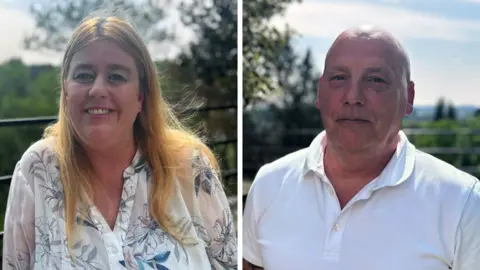 BBC
BBCFor Wayne Birkett and Sharon Miller, the morning of 13 June 2023 started like any other.
They both, separately, got ready for work and caught buses into Nottingham city centre, but what happened shortly after would change their lives forever.
They – along with Marcin Gawronski – were struck by a van driven by Valdo Calocane, leaving all three pedestrians seriously injured.
Earlier in the day, Calocane had fatally stabbed Barnaby Webber and Grace O’Malley-Kumar, both 19, and caretaker Ian Coates, 65.
Speaking exclusively to the BBC, Sharon and Wayne have told their stories for the first time and explained how they feel a strong sense of survivor’s guilt.
Sharon’s day started at home with her partner Martin, who she was looking forward to marrying after more than 30 happy years together.

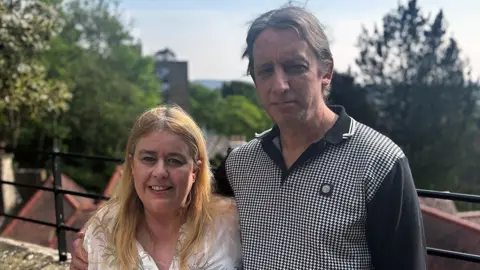
After finishing her morning cup of tea, the mother-of-one made her way to the bus stop, ready to catch her daily ride to her job as a cleaner.
It was early in the morning – shortly before 05:00 BST – and her bus was delayed, leaving her worried she would be late for her shift.
Sharon made her way into the city centre and got off the bus as normal, but her journey to work ended as she crossed Market Street.
“I saw the van, and the next minute I’m in the air,” she said. “I thought I was dying – all I could see was white.”
Sharon was rushed to Nottingham’s Queen’s Medical Centre with life-changing injuries.
“I broke my toe, five ribs, I lacerated my spleen, and I’ve got a big hole in the back of my leg that got badly infected,” she said.

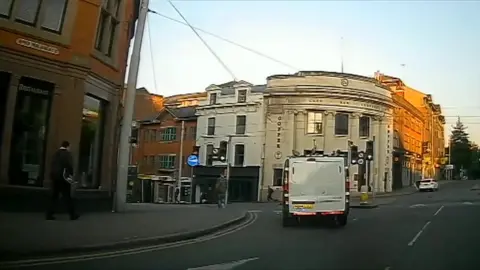 Nottinghamshire Police
Nottinghamshire PoliceSharon, 46, now uses a walking stick and, given the physical demands of her job, has been unable to return to work after suffering serious orthopaedic and psychological trauma.
“I’m still in a lot of pain with my leg and my back, but I’m getting there,” she said.
Once a happy and sociable person who enjoyed trips out with friends and family, Sharon now only feels safe in the comfort of her own home.
“Martin and my family, and my grandkids make me happy, but I don’t like going out,” Sharon explained.
“I was never like that before.”

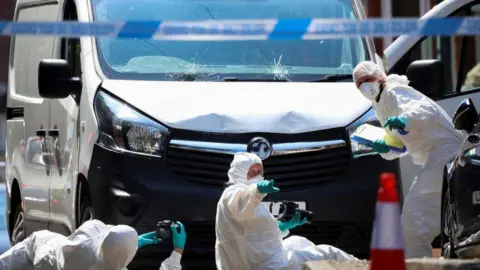 Reuters
ReutersWayne had been on his way to his job as a forklift driver in the city centre when Calocane deliberately swerved across the road and drove into the back of him.
He spent more than six weeks in hospital with complex brain and physical injuries and, unlike Sharon, has no recollection of what happened.
In fact, the 61-year-old struggles to recall any part of his life prior to 13 June 2023.
His injuries were so severe that he has had to re-learn basic skills such as reading, cleaning his teeth, and holding his knife and fork.
Even a tattoo on his arm – a tribute to his beloved Leeds United – was unfamiliar, and when he looked at it, he had to ask his family what it represented.
“My legs hurt all the time, my back hurts, I get headaches all the time and it’s horrible not having any memory and not remembering people you’ve known and worked for,” said Wayne, whose partner Tracey has cared for him since the attacks.

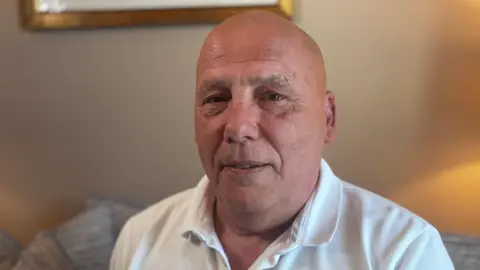
One thing Sharon and Wayne have in common is the survivor’s guilt they have both lived with since the attacks.
“Tracey tells me off for saying this, but I would have swapped my life for one of those poor students – without a doubt,” Wayne said.
“It was awful hearing what happened to them [in the court case]. What happened to me was nothing compared to that.”
Sharon added: “When I heard what had happened to Barnaby or Grace, I thought, ‘I wish he’d took me instead of them’.
“They were so young and still had their lives ahead of them – you just feel so guilty.
“You should be able to go to work, and they should be able to walk around; Ian should have been able to get into his van and go to work.
“It’s just so wrong.”

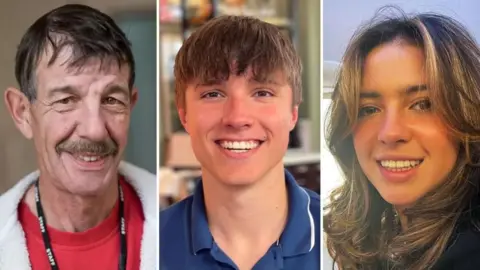 Supplied
SuppliedCalocane, who had been diagnosed with paranoid schizophrenia before the attacks, was sentenced to a hospital order in January 2024 after admitting three counts of manslaughter on the grounds of diminished responsibility and three counts of attempted murder.
The BBC has taken the decision not to publish a picture of Calocane in this feature at the request of the surviving victims.
Sharon said: “It’s constantly on the news all the time, and I’m constantly seeing his face on the news.
“Why keep showing his face?”
The case has prompted a number of reviews, including a mental health homicide review commissioned by NHS England.
And earlier this year, Sharon and Wayne, alongside the families of Mr Webber, Ms O’Malley-Kumar and Mr Coates, were invited to Downing Street to discuss plans for a judge-led public inquiry.

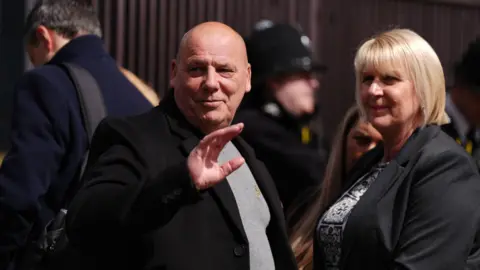 Ben Whitley/PA Wire
Ben Whitley/PA WireThey both plan to engage fully with the inquiry, set to be chaired by Her Honour Deborah Taylor, and hope it will provide answers that lead to meaningful changes to help prevent similar incidents in the future.
Greg Almond, partner and solicitor at Rothera Bray, representing both Sharon and Wayne, said it was “crucial for the survivors to be central to the inquiry”.
“They want to put their story across and make sure they’re not forgotten survivors,” he added.
Follow BBC Nottingham on Facebook, on X, or on Instagram. Send your story ideas to eastmidsnews@bbc.co.uk or via WhatsApp on 0808 100 2210.
More on this storyNottinghamNottingham attacks